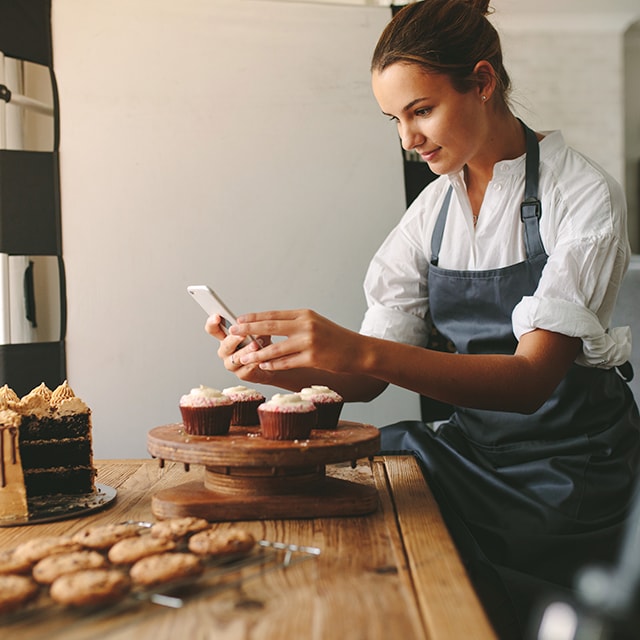6 Professional Food Photography Tips & Tricks
Learn how to photograph food with quick, practical tips from professional chefs.
'People eat with their eyes'. If you've heard that before, you know it means that the taste of food is greatly influenced by how it looks. This is why good photography is a must when it comes to your menu. Besides, research shows that including well-shot food pics can increase sales of a menu item by up to 30%. The good news is that anyone with a smartphone can take professional quality photos and post them for the world to see.
Want to learn how? Here’s a list of what you can do to up your photography skills and present picture-perfect food pics to your online visitors and walk-in customers.

1. Start by Styling
While your food should be the focus of the shot, styling your shot can push its aesthetic value up. Surround your main dish and background with props such as napkins, crockery and table decorations such as flowers, or a cup of coffee or a pot of tea, if applicable. This way your photography will tell a story and not just show your food.
A key thing to remember is to ensure your eye can move easily across the frame of the shot. You can achieve this by balancing your props on different sides of the focal point of your photograph.

2. The best lighting for food photography
There is no doubt that a well-lit food photograph can elevate the mundane into something beautiful. However, most establishments don't have access to professional lighting equipment, so we recommend using only natural light. Find a place near a window, or even outside in a courtyard that is well lit without being in direct sunlight. Keep in mind that different times of the day will also affect the light.
Avoid using your camera’s built-in flash. There’s nothing that kills good photography like flash does - it creates harsh reflections, adds unnatural hues and shadows to your photos that are difficult to edit out, and tends to flatten an image and make it dull.
Professional photographer Remko Kraaijeveld exlains the different types of lighting in our Social Media photography course.

3. Get perspective: what angles to work with
There are two basic angles for food shots - either shoot low or directly above, about 10-40 degrees from the table or overhead for a flat lay look. It all depends on what you are shooting. The subject of your photography determines which angle you decide to use.
If you plan on taking a picture of a table full of food, a top down shot would be the best photography option to get everything in frame while avoiding background distractions. But if you’re taking a picture of a multi-layered drink, a dish with many ingredients, or a single plate, a close up or side shot is better. It would make your photography look delicious.
Professional photographer Remko Kraaijeveld exlains angles and composition in our Social Media photography course.

4. Get up close
Always remember that food is the hero of your photo. You are here to shoot food and nothing else. Not the background or the props, though they help enhance your photograph.
When it comes to food photography, the tighter the shot the better the outcome. So, don't be afraid to crop into an image you've taken to get a more detailed depiction of the food. You will need to crop images to square for your Instagram feed, so keep this in mind when you are taking your shot. Head over to our tips on Instagram Marketing for more info.

5. Use a trusty tripod
They might be a bit clunky to carry around, but using a tripod has heaps of advantages. It lets you choose the optimum position for your camera, adapt the styling once the shot is locked in, improves the sharpness of the image, and increases the odds of getting a cleaner shot.
There are plenty of options available for you to choose from. Since your subject is food, you would want to look for the smaller tripods that you could prop up on your table.

6. Perfect it post-processing
There are countless photo editing apps available, most of them for free - we recommend SnapSeed, Afterlight and VSCO. You can also use standard editing features in the photo app that comes with your camera. These apps help enhance the vibrancy of an image, blur the background (depth of field) and apply filters and frames so you can create a style that is unique to your establishment.
Spend some time experimenting with different styles and effects until you can confidently repeat the kind of shots you like. Good food photography as well as in-action shots of your staff can really boost your social media engagement. Keep in mind that story-telling photography is key to get attention. And when done well it can draw more customers to your establishment.
Related Articles
What you'll get:
- Access to free Chef trainings
- The best recipes and tips from Chefs around the world
- The latest culinary trends
